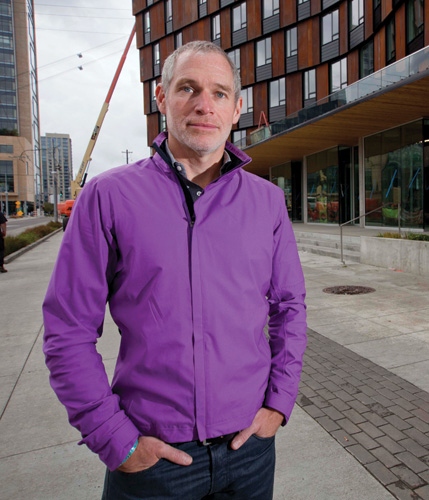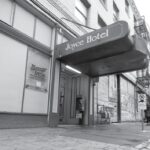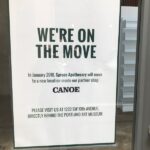 Developer Tom Cody leaves a creative mark on Portland.
Developer Tom Cody leaves a creative mark on Portland.
BY BRIAN LIBBY
 |
Tom Cody, managing partner, Project^// Photo by Adam Wickham |
Standing on the top floor of the new Emery Apartments in Portland’s burgeoning South Waterfront district feels like being on the prow of a ship. Clad in weathered steel, a nod to the Zidell barge-building facility across the street, the building leans forward from the top, as if with the break of a champagne bottle the 118-unit, $20 million project will slide into the Willamette. As developer Tom Cody takes in the panoramic view, a decade’s worth of condos towering overhead at right and a TriMet bridge under construction to the left, one can easily imagine a ship’s wheel in front of him. With three new central city projects opening in as many months, each attracting rave reviews and an influx of tenants, Cody represents a postrecession way forward: development that is smaller, smarter and rooted in place.
“We are very much committed in each case to actually stepping back and allowing the landscape and the context around us to inform the design,” Cody says of the approach his firm, Project^, takes to development. “That leads to a very clear and compelling design vision for each project, which in turn yields economic value down the road.”
Each of Cody’s projects seems to have transformed its respective neighborhood. The $4.5 million Union Way, an early 20th-century warehouse on Southwest Stark Street, featured an ideal location between the hip Ace Hotel and Powell’s Books but only a small amount of retail frontage. Working with architect Thomas Robinson, Cody carved an alley through the middle of the building so it could be lined with 10,000 square feet of boutique retailers — turning the architecture inside out. Because the alley can be used as a shortcut from downtown to the Pearl, it is already packed with visitors. San Francisco-based clothier Self Edge, for example, reports Union Way marks its biggest-ever opening.
Former University of Oregon athletic director Pat Kilkenny became an investor in Union Way and Cody’s other developments after being impressed by the developer’s blend of discipline and vision — a quality he’d seen in former Ducks football coach Chip Kelly. “A lot of Chip’s success is about the fundamentals: blocking and tackling, hard work and showing up for practice. But he’s this leading-edge thinker, a game changer,” Kilkenny explains. “Tom’s similar. It’s unique that you can find people who get both sides of the equation.”
That balanced outlook came early. Born and raised in Los Angeles, Cody’s first influence was his academic parents, one of whom studied ancient civilizations and the other ecology. His first job out of college was working for the nation’s most acclaimed architect, Frank Gehry, whose passion and creativity influenced his pupil — as did some unexpected advice. “Frank said, ‘You don’t want to be an architect,’” Cody remembers. “That’s where I learned that planning and development is, I’d argue, the best way to practice architecture.” Cody went on to study urban planning at the Harvard Graduate School of Design, after which he relocated from Los Angeles to Portland in search of a better balance between the urban and natural worlds.
A youthful-looking 43, Cody believes Union Way says something about the formulaic nature of other developers, who may have simply tried to make the building resemble other existing projects. “Your typical property developer would say there are five categories of retail: suburban mall, urban mall, lifestyle shopping centers, street front or strip retail,” he explains. “Well, Union Way says, ‘No, there’s a sixth.’ I think that’s indicative of an attitude that says, ‘What if we reach further?’”
Nearby Union Way is ArtHouse, the first residence hall at Pacific Northwest College of Art, which is helping make the previously sleepy North Park blocks into a vibrant new campus for the school. Cody’s company coordinated a partnership between PNCA and Powell’s Books to realize the $7.3 million project, building ArtHouse on the site of the bookseller’s former technical-books outpost. Referring to Cody, Powell’s founder Michael Powell says, “He represents a new generation of developers who will replace the John Carrolls and Al Solheims in being local and sensitive to Portland but being adventurous.”
Before forming Project^ in 2008, Cody worked for two larger local developers: Opus Northwest and Gerding Edlen. The latter he viewed as a progressive large-scale developer, and while at Gerding, Cody worked on major Portland developments such as the Civic on West Burnside next to Jeld-Wen Field, and the Twelve West tower in the West End. But Cody sought to work on a smaller scale with a higher level of flexibility. His own projects have all been privately funded, meaning they are free from strictures imposed by real estate investment trusts, pension funds and other common sources of development capital.
“A lot of times, even the best developers will get caught up in that trap of just saying, ‘This is what I want to build,’ and allowing the project to be driven by math,” Cody says. “And math is important; our business acumen is the reason we’re here today. But we’ve also proven that by focusing on design, the math gets better and the yield gets higher.”
Indeed, the Emery is on track to be completely leased within six months. Carved into a hillside, it’s dwarfed by the adjacent condo towers, but already it seems evocative of place and full of life. “If there’s any kind of pixie dust we have with respect to how we look at development and identify opportunities,” Cody says, “it’s that we have a more creative response.”



